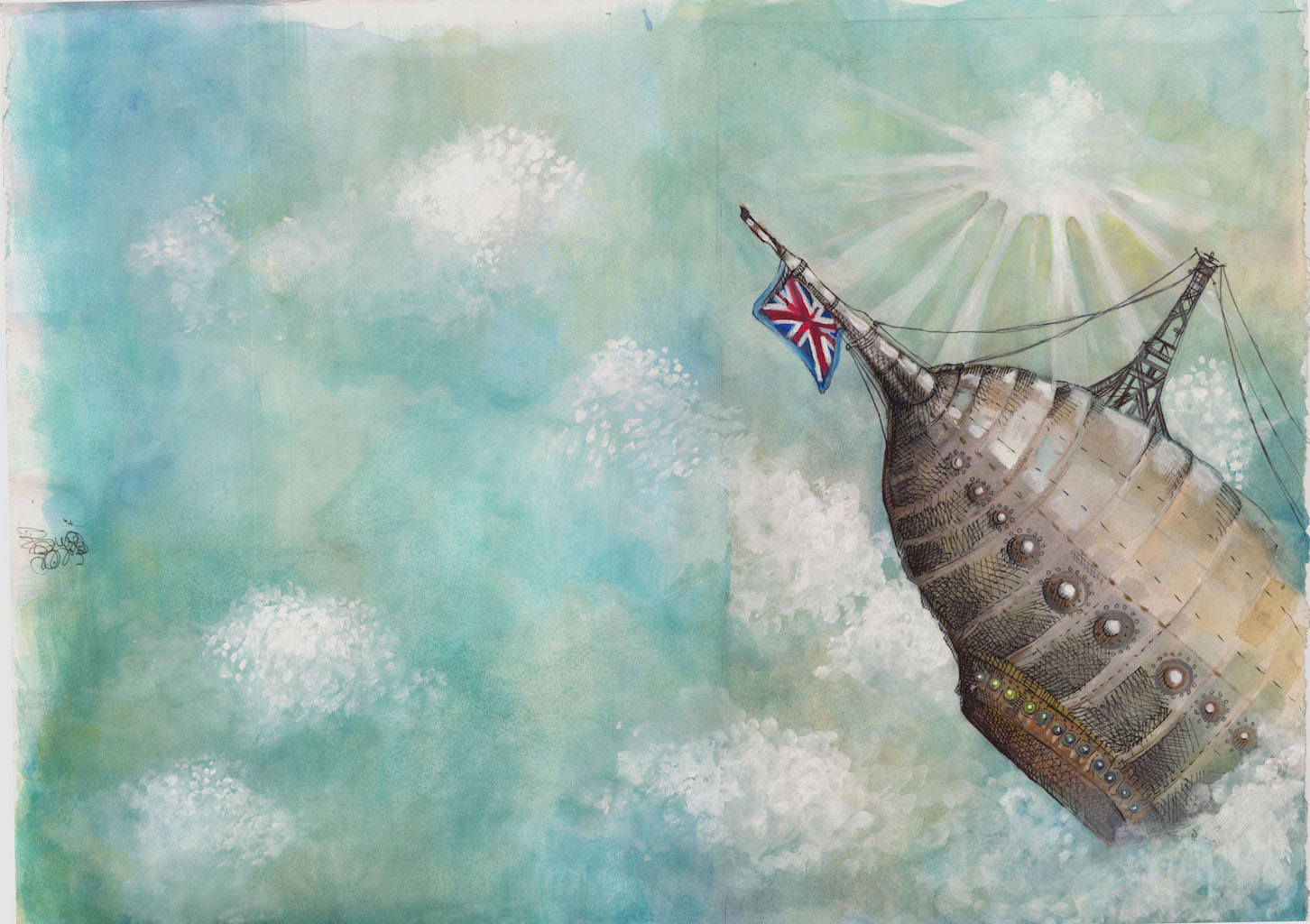New Year, New Look – Part II
As I mentioned in my last post, I’ve been updating the covers of my existing books. This month, I’m proud to reveal the new cover for my second book, The Reluctant Agent:
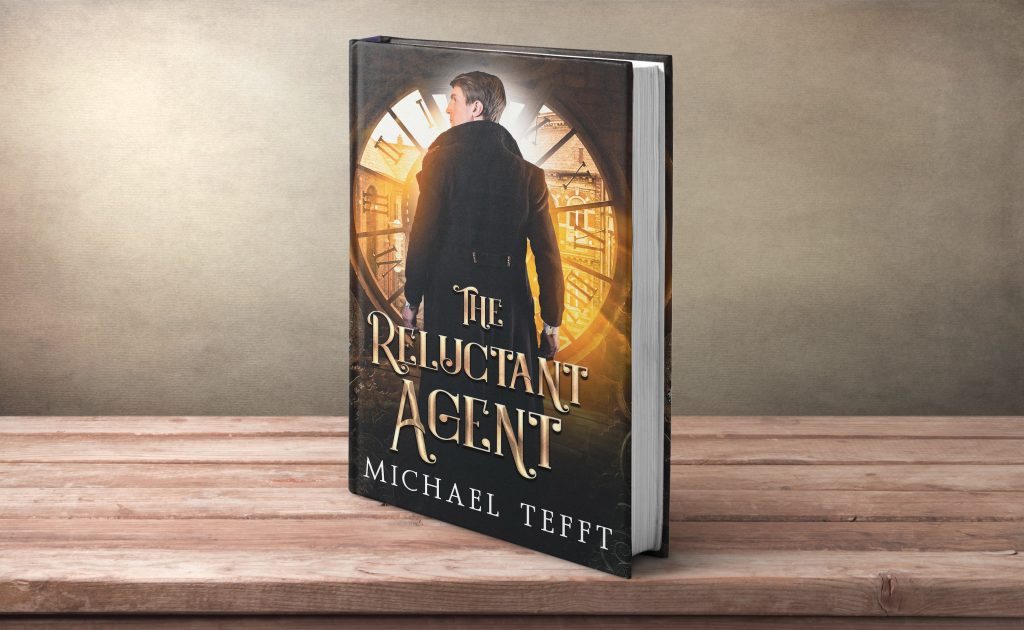
I’ve just spent the afternoon updating the covers…everywhere. Everything should be processed in a few days.
What Else Is Going On?
I’ve received most of the feedback from my beta readers and I’m making the final tweaks. Once I do that, I’ll take one more editing/proofreading pass and then it will be ready to start the publishing process. Given the lead time for getting a new cover (which I can’t do until I know exactly how big the book will be), I think that the actual release day will be in April – date to be determined. Watch this space for news of when the pre-order will be available.
Join the Crew
Once again, I invite you to join my email newsletter – You can do that over on the right under the “Join the Crew of the Daedalus” box. Members of the newsletter get early notifications about what’s going on and extras. Recently, I’ve shared some images I generated using Mid-Journey (AI Generative Art) to highlight some scenes from both The Reluctant Captain and The Reluctant Agent.
Until next time,
Happy Journeys!
Mike
New Year, New Look
Happy New Year everyone! I hope that 2024 brings you health and happiness!
2023 was certainly an interesting year. I finally finished the writing and editing of the newest Malcolm adventure. My daughter has started her own adventure with her new husband and my wife and I are adjusting to an empty house. And 2023 ended with the start of renovation of our kitchen. As I post this, we no longer have an oven. It won’t be long before the stove and sink are gone as well!
But 2024 is a new start – As part of that new start, I’m “re-releasing” my existing books with new covers. While I love the artwork on my current covers, they don’t match other steampunk books on the market. So I’ve commissioned new covers that I plan to roll out over the next two months. Although I have already shared the new covers with members of my newsletter (you can be a member as well by clicking the link on the right to join the Crew of the Daedalus!), I present to you the new cover for The Reluctant Captain:
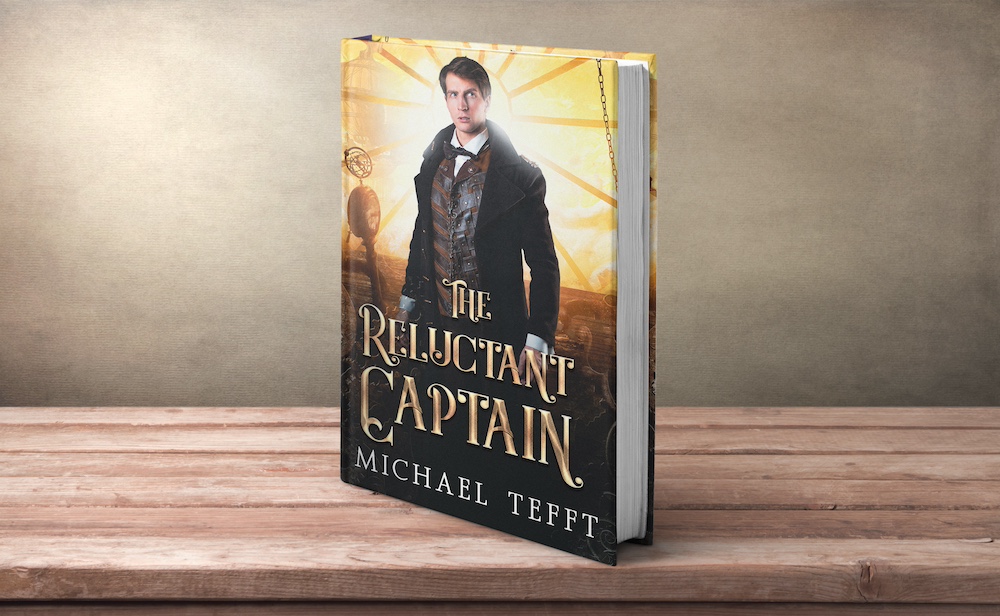
I will update the new cover on the various ebook stores soon – it will take me a little longer to get them in place for the print editions.
I’m still gathering feedback from my beta readers to see if the new Malcolm novel (which still doesn’t have a title) to see if it needs any changes before I publish it. I’m shooting for publication in March (fingers crossed).
If you want to be notified as soon as the new book is up for pre-order, I encourage you to join the Crew of The Daedalus, my sometimes regular e-newsletter.
Until next time, Happy Journeys!
Mike
Bits and Bobs
Again, over a month vanishes and I haven’t posted anything here. I’ve had a busy month writing-wise and I haven’t had much time to document much of it.
In My Solitude
On October 19, I a couple of hours to Saugerties, NY for a mini writing retreat. I got there about 2:00 PM and after getting unpacked and settled in. Here’s a picture of my cabin:

I did take a brief break on Saturday to travel to Woodstock and get cupcakes from Peace, Love, and Cupcakes to bring home for my family. They were epic!
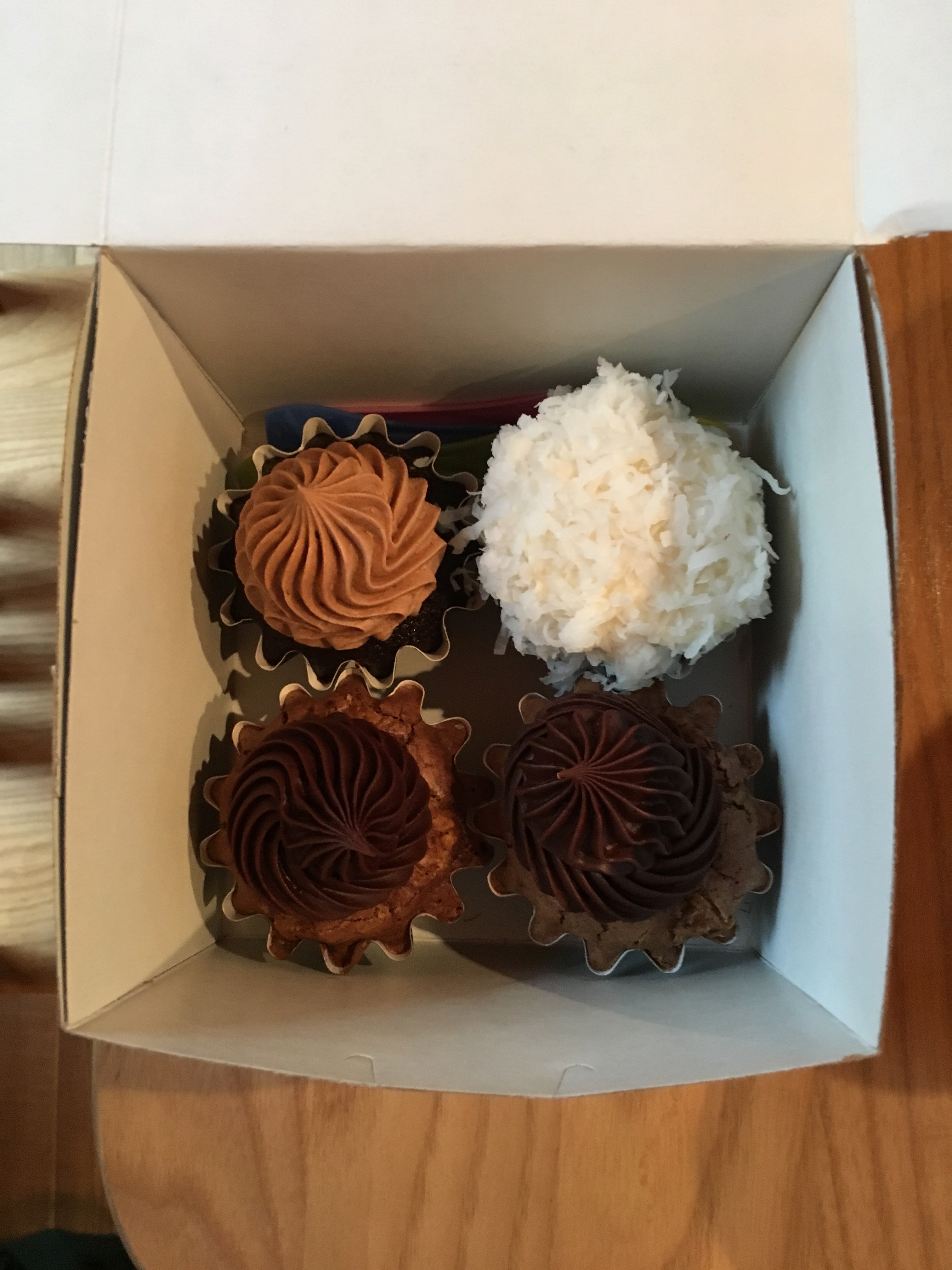
It was productive and I wrote over 7000 words that weekend which is a respectable total for me.
One of the coolest things that happened was I was looking for something to watch while I ate a late supper and I stumbled upon a horror movie show called Creature Features on the public access channel. It’s based in California and is reminiscent of Elvira, Mistress of the Dark. The cast introduces the movie and comments before and after each commercial break. The movie that night was Daughter of Frankenstein. It made me nostalgic for a show in my youth, Monster Movie Matinee. This was particularly serendipitous as I was working on a horror anthology where a show like this will play a central role.
“Shouldn’t you be working on book #2? Who do you think you are, George RR Martin?”
The above is a quote from one of my college roommates. No, I’m not consciously emulating George R. R. Martin’s penchant for not finishing the Game of Thrones book that everyone wants. I’m in the process of getting The Reluctant Agent edited by someone who isn’t me. My goal is to publish the book sometime in the Spring of 2019. In the meantime, I still want to write and I’m not quite ready to tackle Book 3 while wrapping up Book 2. So I decided to try my hand at horror short stories. Given the time I have available, it’s easier to work on a short story that’s going to track around 5000 words than it is to try to dig into a new novel. My hope is that after I finish up The Reluctant Agent, I can have this horror anthology edited and work on Book 3 of the Reluctant series. I hope to release the horror anthology September 2019.
Miscellaneous Writing Learnings
Last time I wrote, I said that I was experimenting with software called Scrivener to write my next work and use it to outline and plot my horror anthology. I have absolutely fallen in love with using Scrivener for a large writing project like a book. It keeps everything you need to write right at your fingertips and helps you track your progress. I actually attended a webinar on how to use Scrivener faster. I learned so much. One of the things I learned was that you can use emojis as icons for your writing pieces. And since I was in the middle of a short story that wouldn’t work the way it was structured, I turned most of the status icons to the “Pile of Poo” emoji to tell me I had to rewrite it:
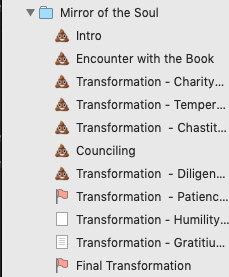
I’m working my way through the software and I am positive that this is going to be the tool of choice for my writing from here on.
This turned into a much longer post than I intended. I guess I had a great deal to share.
Until next time…whenever that will be….
Happy Journeys!
Mike
PS – Since we have somehow decided that the Christmas season begins the day after Halloween, I just want to say that books make great gifts…particularly my book…which you can conveniently purchase through the link on the top right of the page…
Read MoreFighting the Imposter Police
As you might have surmised, I’ve been incommunicado for the last two months. Where have I been?
As I’ve mentioned in the past, music is my other passion. It has to be because I’ve spent most of the last month playing trumpet in a concert band, the orchestras of three musicals, and two Easter church services.
Why Music?
Music has been a part of my life ever since I picked up a trumpet in 4th grade…which was many years ago. I’ve played in two community bands since not long after I learned to play. I played concert, marching, and jazz band although high school. If it weren’t for the fact that I discovered computers in high school, there is an excellent chance that I’d would have majored in Music instead of Computer Engineering. At the time, I decided that it would be easier to be a computer engineer who was a musician than being a musician who was into computers.
I’m Not A Musician, But I Play One On TV
When I’m playing in the orchestra pit, I am surrounded by retired or active music teachers. I always seem to be one of the only people who never had any lessons past high school, let alone major in music. I always feel like such an impostor. I wait for someone to say, “What is he doing here? He’s not a real musician,” and then the Imposter Police haul me out of the orchestra pit for being a fraud. I feel that all of the time, but I still keep putting myself out there because each time I do, the voice of the Imposter Police gets softer and softer. In one of the musicals, I worked with a new musician and he asked me, “Where do you teach?” That made me feel like I really am a musician.
What Does This Have To Do With Writing?
My writing life is like my musical life. I’m an engineer by training. I took one creative writing class in college and a couple of creative writing classes offered by our local arts organizations. Nothing would indicate that I should be a writer. And if I feel like an imposter when I’m a musician, it has nothing on how unworthy I feel when I call myself a writer. It hits me when I’m stuck trying to figure out how to move forward with a story and particularly when I’m editing. I hear the Imposter Police telling me, “You’re not a writer. This is awful. No one is ever going to want to read this.”
The Only Way Out Is Up
The only way to turn the volume down on the Imposter Police is to just keep working at it. Just keep working on it word by word, note by note. When I’m writing, I keep trying to tell myself, “You can fix it later. Just keep writing.”
I’d be lying if I said this always works. I have nights where I just stare at my screen and wallow in what an awful writer I am and wonder why I do this when I could be watching TV or doing…anything else. What makes it worthwhile is when you have one of those moments where you realize, “Yes, I am a writer.” or “Yes, I am a musician.” And you remember that the only difference between a professional is that the professional gets paid. Being a professional anything is no guarantee that you are better than an amateur. I’ve seen community theatre productions that are better than many professional plays. Professional implies training and experience; both of which you can build yourself. Let me let you in on a secret: I’m largely a self-taught musician. Through a fluke of timing, from 7th Grade to Senior Year, I had six different band teachers. It makes it difficult to learn when the environment continually changes. But, if you practice, you can gain that experience and training, albeit much more slowly. And if you love it, it’s worth it.
Happy journeys!
Mike
Read More
In Praise of Beta Readers
Back in November, I asked several of my friends to be beta readers for The Reluctant Agent and this weekend, I received their feedback.
What Is a Beta Reader?
A beta reader is a beta tester for a piece of writing. The beta reader can do a number of things; check spelling and grammar, spot typos, identify plot holes and continuity problems, evaluate characters, and adjudicate the overall quality of the story.
Why Would You Need a Beta Reader?
I can tell you why I needed beta readers more for this book than my previous book. “The Reluctant Captain” was written in a short period – just over three months. This book has been two years in the making. And for whatever reason, it was a slog. There were times when I was really busy and didn’t have time to write, but when I did, the words struggled to come out. I try to adopt the Dory model of writing “Just keep swimming, just keep swimming.” But the whole time I was writing, all I could hear was the Evil Editor in my head telling me, “This is crap. No one would ever want to read this screwed up pile of words.”
For me, having beta readers was the test to see if I was or right (it was a good story and interesting) or if the evil editor in my head was right. And because I’ve read it over and over and over, I’ve lost all objectivity. Part of me was starting to believe the Evil Editor.
I’m happy to report that for the most part, I was right and the Evil Editor was just a nagging voice. That’s not to say it was a perfect book. I received excellent feedback which corresponded to my own suspicions (but not those of the Evil Editor) and I’m going to tear into it and try to shore up some areas.
What I Look For in a Beta Reader
- It’s someone whose judgment and opinion I trust – The people I asked to read my book are people who I’ve known for a long time and I respect their opinions. If one of them recommends a book, I am very likely to read it (and probably enjoy it very much).
- They will be honest, but not in a brutal way – They will tell me if it’s bad, but they won’t make me feel like a failure in the process. Trust me, the Evil Editor in my head is very good at his job and he needs no help whatsoever.
- They are the potential audience for my book – I try to write the kind of book that I want to read. My beta readers fall into that audience as well.
What Does This Have to Do With the Book?
The feedback I’ve received is kind of spot on with some of the nagging voices I had in my head so I’m definitely going to see how I can apply it. I have to say that while I agree with all the feedback, some of it means a minor reworking of the plot that’s been in my head for two years. It’s hard for me to now go back and readjust it because I’m not sure what I’m going to do.
So I have a couple more weeks of tinkering. But that’s a good thing.
Thanks to Keven, Melanie, Bob, and Donna for reading it!
Happy Journeys!
Mike
Read More
Writing and Coding
In the past few weeks, I’ve been writing and thinking about writing more. As I’ve mentioned in the last post, I’ve been listening to the Write Now podcast on my forty minute commute to and from work. The Write Now podcast includes a separate set of podcasts called “Coffee Break” which are interviews with authors. The mix of both episodes about writing and episodes about other writers got me thinking about how I write.
I seem to have been predisposed to wanting to write fiction. I remember my favorite times in English class were the rare times we got to do creative writing. In middle school, a friend and I wrote a very crappy (and short) derivative fantasy novel in the vein of Lord of the Rings and The Sword of Shannara. In college, I took Creative Writing as one of the three liberal arts classes I had in my schedule (I was an Electrical and Computer Engineering major).
I also discovered computers during high school. This was in the heady days where memory was measured in kilobytes and a storage device was a cassette recorder. To totally give away my age, I cut my programming teeth on Apple II’s and a Commodore 64. I am happy to have missed the days of punch cards, but not by very much.
My day job is software developement, so I write code. I’m at the start of an upgrade project where we have to rewrite a bunch of the code that makes the screen look pretty (there’s the highly technical description). Between that and the podcasts, my brain has realized how writing code for nearly half the day impacts my writing.
Ways Coding and Writing Are Similar
- Both Start with a Blank Page – When you write code, you are starting with a blank screen just like in writing.
- You Take Thoughts and Give Them Physical Manifestation – In coding and writing, you take logical processes and translate them in a physical manifestation just like the writer takes his/her thoughts and creates the physical manifestation of the story.
- The Physical Act of Coding is Identical to Writing – It’s no coincidence that programmers “write code”. In coding, you have a fixed grammar consisting of words and rules for how they must be combined. Computers don’t let you violate the basic rules of syntax or grammar, but as in writing, there’s nothing to stop you from creating a non-sensical, grammatically correct statement.
- You Have to Create a Logical Sequence that Directs the Flow– Coders constantly wrestle with taking data, applying some action, and sending to the next logical step in the process. Writing also needs to follow a logical sequence; if you’re writing a mystery, the killer has to pick up the weapon before it’s used, the body must be discovered, the inspector must uncover the clues and solve the mystery. Readers don’t like it if the plot of a novel doesn’t flow in a logical sequence or a deus ex machina device shows up to eliminate the conflict (although I could tell you there are days that I could us a deus ex machina device to fix my code!).
- Debugging and Editing – Same thing. In coding, you fix your “shitty first draft” of code; in writing, you fix your “shitty first draft” of the story. In both, you have to fix syntax, correct logic errors and generally look at it and say “Why did I do that?”
Ways coding has influenced how I write:
- I have to start with a clear idea of the “problem” – Like in programming, you have to know what it is you hope to accomplish. For my novels, I have a very loose outline in my head where I know the general plot points so I’m always moving from or to the plots points. And like a programmer, none of that is documented except in my head.
- I have to work in a linear fashion – I have to start at the beginning and work my way to the end. I would have a difficult time writing scenes out of order and reassembling them into a whole. I have to work chronologically in the story.
- It impacts the tools I used – I write with Microsoft Word. Many writers use it; many writers don’t. Tools like Scrivener let you break your work apart into pieces and allow you recombine it however you wish. Other editors do this or also offer a distraction free environment. I like Word because it really is the IDE (Integrated Development Environment) of writing; there isn’t much you can’t do with Word.
- I do best when I can scroll through the whole novel – This is related to line above. I need to see the whole novel and be able to scroll up and down. I have a sense of where the information I’m looking for can be found and I just scroll back and forth until I find it. I think that comes from moving back and forth betweens screens of code.
- Coming up with a clever solution to a problem makes me happy – I get a great deal of pleasure from staring at a problem (in either code or writing) and coming up with a clever solution to fix it. When I fix something that hasn’t been working, I get very happy. Conversely, when I can’t figure out what’s wrong, I get very frustrated.
- Trying to avoid the use of if/then in my writing – I’ve heard it said that you can tell a programmer’s writing versus a non-programmer’s writing by the use of if/then in his/her writing. For me, this started with my first computer language: BASIC. The construct for determine what to do during a certain condition was always:
IF <something is true> THEN
do something
ELSE
do something else
END IF
While I don’t write exactly like that, it’s second nature to write something like “If I can’t fix this, then we can kiss our asses goodbye.” OK – maybe that wasn’t the best example, but it’s very easy for it to sneak into my writing. And I work equally as hard to excise it.
So What Does This Have To Do With Anything?
So glad you asked. I think understanding the things that affect how you write gives you a wealth of information. It shows you your strengths, your weaknesses, and things that can give you ideas to try something outside your comfort zone. Looking at this list, I think that a good challenge for me would be to either write something with a non linear plot or write the linear plot in a non-linear manner. Or use other tools to move the writing around throughout the work.
How does your profession influence the way you write?
Happy Journeys!
Mike
Read More
